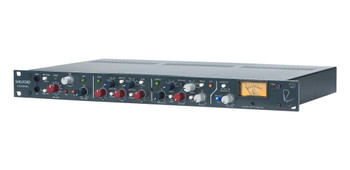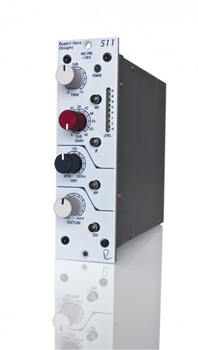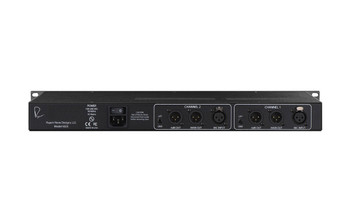Description
Rupert Neve Designs Newton Channel
Mic Pre + EQ + Compressor with Silk
A powerful modern channel strip with an instantly recognizable sound.
The Newton Channel is a powerful modern channel strip born from a legendary sonic lineage. Its intuitive design provides classic sound on demand, with all the instantly-recognizable character, musical tone- shaping abilities, and proven reliability that define a Rupert Neve Designs product. The Newton is equally well-suited for a project studio, large-scale commercial facility or live sound rig – giving more engineers, producers, and artists a chance to join the RND family than ever before.
The name originates with Rupert’s birthplace – Newton Abbot, England – and reflects the sonic journeys of his life: from Newton Abbot to Wimberley, vintage to modern, and everything in between. This is a truly versatile, world-class channel strip capable of bringing any source to life with the classic sound of Rupert Neve Designs.
The Newton Channel includes a fully Class-A mic preamp, a musical, 3-band discrete EQ section, a fast & flexible VCA compressor, and custom Rupert Neve Designs transformer-coupled outputs with our revolutionary harmonic color stage: variable Silk Red & Blue.
The Input Stage & Mic Preamp
The Newton’s microphone preamplifier contains all the tone and musicality expected from a Rupert Neve Designs piece. This preamp makes it incredibly easy to quickly dial in a tight, clean and detailed sound; and with a robust 72dB of gain including 6dB of fine trim control, the Newton is ideally suited for a wide variety of sources.
While the input stage is tailored to be an ideal match for standard microphone source impedance, it is equally happy being driven by line levels – so a pair of Newtons can also be put to use as a high-end mixing tool for any studio. The Newton also includes our distinctive variable high-pass filter with a comprehensive frequency range adjustment and independent bypass switch, allowing the engineer to quickly eliminate unwanted noise, rumble or other low frequency build-up in the source signal.
The Equalizer
The EQ section in the Newton is optimized for speed & flexibility with a simplified set of controls. The low and high frequency shelf bands are controllable with accurate 31-detent potentiometers that provide up to 12dB of gain boost/cut, providing the ability to dial in either subtle or extreme settings as desired.
The parametric mid-band of the Newton EQ section includes another 31-detent potentiometer and a wide range of mid frequencies to boost or cut, switchable from 220Hz to 7kHz. This makes the MF band particularly flexible, allowing for taming low-mid muddiness, boosting mid frequency presence, or removing any harshness in the upper midrange. The carefully-chosen fixed Q setting maintains a healthy balance of musicality and precision – just wide enough for brush-stroke equalization without adversely affecting neighboring frequencies.
As with every section of the Newton Channel, the EQ has an independent bypass button for double- checking settings every step of the way.
The Compressor
The Newton Channel also contains the latest iteration of Rupert Neve Designs’ ultra-smooth VCA compressor, with +20dB of make-up gain and ample control for any amount of needed compression while maintaining an effortless sound. Also included is a helpful ‘pre EQ/post EQ’ push button to place the compressor either before or after the EQ section, plus an independent bypass button.
Variable Silk
At the end of the Newton’s signal path is the unique & highly coveted variable Silk circuit, providing the power & control to amplify 2nd and 3rd order harmonics by saturating our custom Rupert Neve Designs output transformers for a vintage tonality.
With the variable Texture knob, the engineer is able to precisely dial in the desired amount of harmonic density – with Silk Red mode highlighting harmonics in the highs and upper mid frequencies, and Blue mode accentuating harmonics in the lows and low mids. From a subtle transformer tonality without Silk, to significantly more color than vintage modules with the Silk / Texture circuit fully pushed, the Newton’s output stage can fill out tracks with enhanced power and sparkle.
Custom Transformer Outputs
The Newton Channel has a custom transformer output stage with a balanced MAIN standard line level output. Additionally, a separate -6dBu XLR output can compensate for high levels of input and Silk harmonic saturation, enabling engineers to fully drive the Newton to achieve more transformer harmonics without clipping the next device in the chain. Both outputs are active and can be used concurrently.
FRONT PANEL FEATURES
- Mic Gain - 12-position rotary switch that controls the microphone preamp gain in 6dB steps. For line level input signals, set the Mic Gain to the “0dB” position.
- 48V - Push-button switch that illuminates RED when +48V Phantom Power is engaged.
- Ø (Polarity) - Push-button switch that illuminates AMBER when engaged and inverts the phase of the preamp signal.
- TRIM - 31-detent potentiometer that allows the user to adjust the preamp gain within a range of +/- 6dB.
- HPF - Push-button switch that illuminates GREEN when the high pass filter is engaged.
- FREQ - 31-detent potentiometer that allows the user to adjust the cutoff frequency of the Sallen-Key high pass filter within a range of 20Hz to 250Hz.
- EQ IN - Push-button switch that illuminates GREEN when the EQ section is engaged.
- LF - 31-detent potentiometer that controls the amount of boost or cut for the low frequency shelf within a range of +/- 12dB.
- 60/150 - Push-button switch that selects between the two available low frequency shelf frequencies: 60Hz (OUT) and 150Hz (IN).
- MID FREQ - 31-detent potentiometer that controls the frequency of the midband peaking EQ within a range of 220Hz to 7kHz.
- MID - 31-detent potentiometer that controls the amount of boost or cut for the MID FREQ peaking EQ within a range of +/- 12dB.
- 8K/16K - Push-button switch that selects between the two available high frequency shelf frequencies: 8kHz (OUT) and 16kHz (IN).
- HF - 31-detent potentiometer that controls the amount of boost or cut for the high frequency shelf within a range of +/- 12dB.
- COMP IN - Push-button switch that illuminates GREEN when the compressor section is engaged.
- THRESHOLD - 31-detent potentiometer that controls the compressor threshold range from +20dBu to -30dBu. When the input signal rises above the set threshold level, compression begins with a soft-knee at a 2:1 ratio.
- RELEASE - 31-detent potentiometer that controls the compressor release time. The overall timing range available is 50mS (FAST) to 500mS (SLOW).
- GAIN - 31-detent potentiometer that controls the compressor make-up gain within a range of -6dB to +20dB.
- PRE EQ - Push-button switch that routes the compressor section ahead of the EQ section when engaged.
- SILK - Illuminated push-button switch that toggles through the three available SILK modes: OFF, RED, and BLUE.
- TEXTURE - 31-detent potentiometer that controls the amount of SILK harmonics added within the transformer output stage when SILK is engaged.
- GR and OUT Metering - 8-segment LED meters that indicate compressor gain reduction (dB) and output level (dBu).
- POWER - LED that illuminates GREEN when the Newton Channel is powered ON.
REAR PANEL FEATURES
- POWER - IEC AC power inlet with integrated power switch. 100-240VAC at 50/60Hz. 35 Watts maximum AC power consumption.
- GROUND LIFT - Slide switch that lifts XLR Pin 1 from chassis ground on the MAIN OUT as well as the -6dB OUT to help isolate from ground interference.
- -6dB OUT - Balanced XLR output utilizing a lower level, secondary output on the custom Rupert Neve Designs transformer.
- MAIN OUT - Balanced XLR output utilizing a custom Rupert Neve Designs transformer.
- LINK - 1/4” TRS jack that allows two Newton Channel compressors to be linked together for stereo compressor operation. *Only intended for use with other Newton Channel LINK jacks.
- INPUT - Balanced XLR-1/4” TRS combo jack input that can be used for MIC or LINE level signals.
Specifications
Note: All measurements typical; all measurements recorded using 25ft. XLR output cables
- Input Impedance: 8900 Ohms
- Input to Line Output (No Features Engaged, Un-weighted)
- Maximum Input Level: +23.6dBu
- Noise (Un-weighted)
- Line Out (Unity Gain): -102dBu
- -6dB Line Out (Unity Gain): -107dBu
- Line Out (+30dB Gain): -95dBu
- Equivalent Input Noise @ +30dB Gain (EIN): -125dBu
- Maximum Output Level @ 1kHz: +23.6dBu
- Frequency Response
- <10Hz to 30kHz: +/- 0.1dB
- <5Hz to 70kHz: +/- 0.25dB
- <5Hz to 140kHz: -3dB
- THD+N, BW (<10Hz to 22kHz)
- 0dBu at 1 kHz: 0.0013%
- +20dBu at 1 kHz: 0.0007%
- Input to Line Output (Equalizer Engaged)
- Noise (BW <10Hz to 22kHz): -90dBu
- THD+N @ 0dBu (EQ Flat): 0.003%
- Input to Line Output (Compressor Engaged)
- Noise @ 0dB Make-Up Gain (BW <10Hz to 22kHz): -91dBu
- THD+N @ 0dBu (EQ Flat): 0.005%
- Compressor Section
- Attack Time: 20ms (fixed)
- Release Time: Variable; 50ms (Fast) to 500ms (Slow)
- PRODUCT DIMENSIONS (W x D x H) 19” (48.3 cm) x 8.125” (20.63 cm) x 1.75” (4.5 cm)
- SHIPPING DIMENSIONS (L x W x H) 24” (61 cm) x 13” (33 cm) x 4” (10.2 cm)
- SHIPPING WEIGHT 9 lbs. (4.1 kg)














